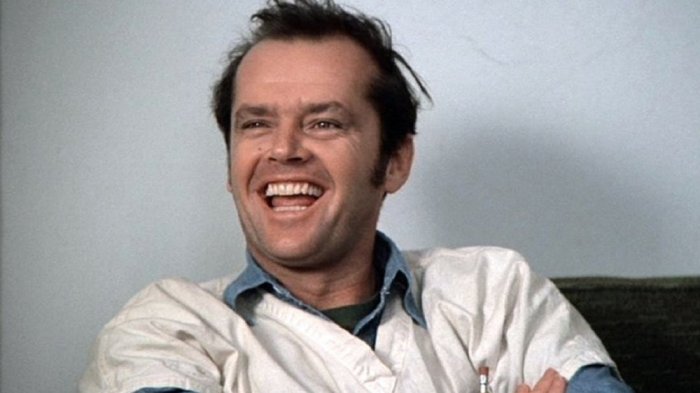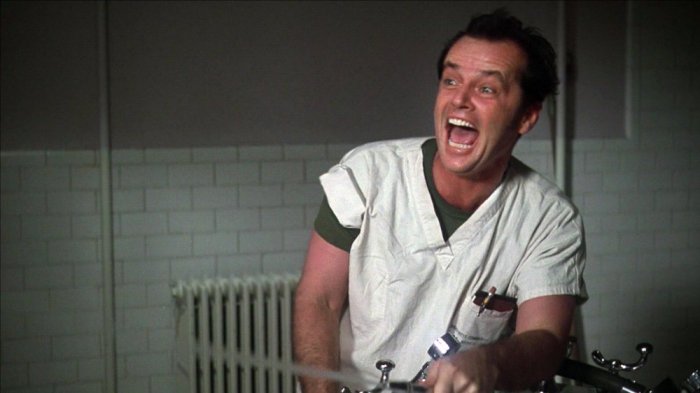One flew over cuckoo’s nest quotes – In Ken Kesey’s groundbreaking novel, One Flew Over the Cuckoo’s Nest, a rebellious inmate challenges the oppressive authority of a psychiatric hospital, sparking a profound exploration of individuality, freedom, and the nature of madness. Through the unforgettable characters and poignant quotes, this literary masterpiece continues to resonate with readers, offering insights into the complexities of the human condition.
Character Analysis
The characters in One Flew Over the Cuckoo’s Nestare complex and multifaceted, each representing a different aspect of the human experience. Randle McMurphy, the protagonist, is a charismatic and rebellious inmate who challenges the authority of Nurse Ratched and the oppressive environment of the mental hospital.
Chief Bromden, the narrator, is a Native American who has been institutionalized for many years and has learned to cope with the system by retreating into silence. Nurse Ratched is the tyrannical head nurse who represents the dehumanizing and oppressive nature of the mental health system.
Randle McMurphy
McMurphy is a symbol of rebellion and individuality. He refuses to conform to the rules and regulations of the hospital and constantly challenges the authority of Nurse Ratched. His actions inspire the other patients to stand up for themselves and fight for their rights.
McMurphy’s rebellious nature is ultimately his downfall, as he is lobotomized for his behavior.
Chief Bromden
Chief Bromden is a complex and enigmatic character. He is a witness to the events of the novel and provides a unique perspective on the mental health system. Bromden has learned to cope with the system by retreating into silence, but he is also a keen observer of the world around him.
His insights into the characters and events of the novel are invaluable.
Nurse Ratched
Nurse Ratched is the antagonist of the novel. She is a cold and calculating woman who uses her power to control and manipulate the patients. Ratched represents the dehumanizing and oppressive nature of the mental health system. She is a symbol of the forces that seek to control and suppress individuality.
Themes and Motifs

One Flew Over the Cuckoo’s Nestexplores a number of important themes, including rebellion, individuality, and mental illness. The novel also uses a number of motifs, such as the cuckoo’s nest and the fog, to reinforce its themes.
Rebellion and Individuality
One of the central themes of the novel is rebellion. McMurphy’s rebellion against Nurse Ratched and the mental health system is a symbol of the human spirit’s desire for freedom and individuality. The novel also explores the importance of individuality, as each character struggles to find their own identity in the face of the oppressive system.
Mental Illness
Mental illness is a major theme in the novel. The patients in the mental hospital are all struggling with different forms of mental illness, and the novel explores the impact of these illnesses on their lives. The novel also raises questions about the nature of mental illness and the best way to treat it.
The Cuckoo’s Nest
The cuckoo’s nest is a symbol of the mental hospital. The nest is a place where the patients are trapped and controlled by Nurse Ratched. The cuckoo’s nest also represents the cycle of violence and oppression that is perpetuated in the mental health system.
Literary Techniques
Kesey uses a number of literary techniques in One Flew Over the Cuckoo’s Nestto create a unique and immersive reading experience. These techniques include stream-of-consciousness narrative, foreshadowing, irony, and figurative language.
Stream-of-Consciousness Narrative
Kesey uses stream-of-consciousness narrative to give readers access to the inner thoughts and feelings of the characters. This technique allows readers to experience the world through the eyes of the characters and to understand their motivations and actions.
Foreshadowing and Irony
Kesey uses foreshadowing and irony to create suspense and to foreshadow the tragic events that occur in the novel. For example, the novel opens with a description of the fog that surrounds the mental hospital, which foreshadows the oppressive and suffocating atmosphere of the institution.
Figurative Language, One flew over cuckoo’s nest quotes
Kesey uses figurative language to create vivid images and to convey the emotional impact of the events in the novel. For example, he compares the patients in the mental hospital to “cuckoos” who have been trapped in a nest, and he describes Nurse Ratched as a “machine” who is devoid of human emotion.
Historical and Cultural Context: One Flew Over Cuckoo’s Nest Quotes
One Flew Over the Cuckoo’s Nestwas written during a time of great social and political change in the United States. The novel reflects the growing counterculture movement of the 1960s, which challenged traditional values and institutions. The novel also sheds light on the conditions in mental hospitals at the time, which were often overcrowded and understaffed.
Historical Context
One Flew Over the Cuckoo’s Nestwas published in 1962, at the height of the Cold War. The novel reflects the growing sense of disillusionment with authority and the desire for change that was prevalent in the United States at the time.
Cultural Impact
One Flew Over the Cuckoo’s Nesthas had a profound impact on American culture. The novel has been adapted into a successful film, and it has been translated into more than 40 languages. The novel has also been credited with raising awareness of the conditions in mental hospitals and with inspiring reforms in the mental health system.
Counterculture Movement
One Flew Over the Cuckoo’s Nestis closely associated with the counterculture movement of the 1960s. The novel’s themes of rebellion, individuality, and anti-authoritarianism resonated with the counterculture movement, which sought to challenge traditional values and institutions.
Critical Reception

One Flew Over the Cuckoo’s Nesthas received critical acclaim since its publication. The novel won the Pulitzer Prize for Fiction in 1963, and it has been ranked among the greatest novels of the 20th century by several literary critics.
Critical Reception upon Release
One Flew Over the Cuckoo’s Nestwas met with critical acclaim upon its release. The novel was praised for its powerful storytelling, its complex characters, and its insights into the human condition. The novel also won the Pulitzer Prize for Fiction in 1963.
Different Interpretations
One Flew Over the Cuckoo’s Nesthas been interpreted in a variety of ways by critics. Some critics see the novel as a political allegory, while others see it as a psychological study of the human condition. The novel has also been interpreted as a feminist text and as a critique of the mental health system.
Impact of Film Adaptation
The 1975 film adaptation of One Flew Over the Cuckoo’s Nestwas a critical and commercial success. The film won five Academy Awards, including Best Picture and Best Actor for Jack Nicholson. The film adaptation has helped to introduce the novel to a wider audience and has contributed to its lasting popularity.
Quick FAQs
What is the significance of the title One Flew Over the Cuckoo’s Nest?
The title alludes to a children’s rhyme about a bird escaping its cage, symbolizing the protagonist’s attempt to break free from the oppressive hospital environment.
How does the novel explore the theme of rebellion?
Through the character of Randle McMurphy, Kesey portrays the struggle against authority and the desire for individual freedom, challenging the notion of conformity and the power dynamics within institutions.
What is the role of Nurse Ratched in the novel?
Nurse Ratched represents the oppressive force of authority, using her position to control and manipulate the patients, highlighting the dangers of unchecked power and the importance of resisting tyranny.